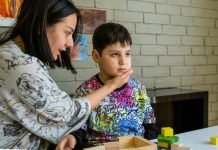
In a new study, researchers found a biological marker in infants that appears to predict an autism diagnosis.
The study of 33 infants showed that the biomarker, a hormone called vasopressin, was present at lower levels during infancy in the cerebrospinal fluid of babies who were later diagnosed with autism than those who were not.
CSF surrounds the brain and spinal cord.
The research was led by Stanford University School of Medicine.
Autism is a developmental disorder characterized by impaired social skills, repetitive behavior patterns, and restricted interests.
Although autism can be diagnosed with behavioral symptoms around 2 years of age, shortages of autism specialists often delay diagnosis until age 4 or later, causing children to miss the benefits of early treatment.
Vasopressin is a protein hormone that’s just nine amino acids long.
It affects social behaviors in male mammals, such as pair-bonding and fathering, and differs by only two amino acids from another, better-known protein hormone with social roles: oxytocin.
Vasopressin appears to play an important role in autism.
In the study, the team used a rare archive of CSF samples collected from infants during routine medical care.
If an infant younger than 3 months develops a fever, doctors typically collect CSF via a spinal tap to rule out brain infections.
The study used CSF that was leftover from such procedures and had been frozen for subsequent research purposes.
After matching 913 archived CSF samples to medical records, the researchers identified 11 infants who were later diagnosed with autism in childhood.
The CSF samples from nine of them were large enough for testing.
Each of these samples was compared with two control samples obtained from children whose medical records did not show an autism diagnosis by age 12.
The researchers found much lower CSF vasopressin levels in infants who were later diagnosed with autism than in those who were not.
Individual vasopressin levels correctly predicted which children would develop autism in seven of the nine autism cases.
The two samples that did not correctly predict autism were from infants who also later were diagnosed with attention deficit hyperactivity disorder.
The researchers also measured oxytocin levels in the CSF samples but did not find they differed between children with and without autism.
The team would also like to study CSF samples from children with other disorders—such as neuromuscular diseases that have a neurologic component but do not impair social skills—to determine whether the finding of low CSF vasopressin is specific to autism.
They also hope to study whether a blood biomarker exists for autism in infants, as obtaining CSF samples is difficult.
One author of the study is Karen Parker, Ph.D., associate professor of psychiatry and behavioral sciences.
The study is published in PNAS.
Copyright © 2020 Knowridge Science Report. All rights reserved.



